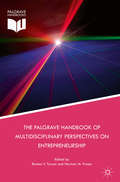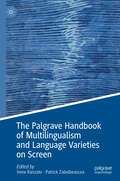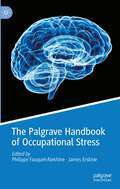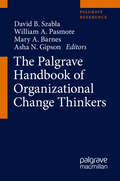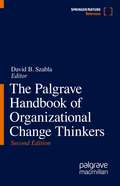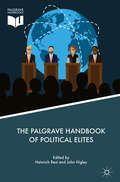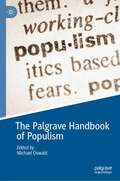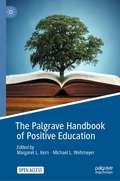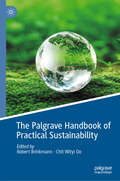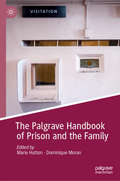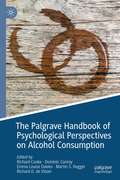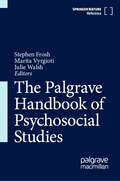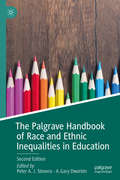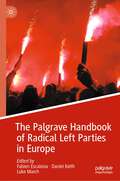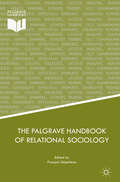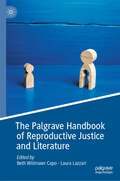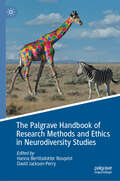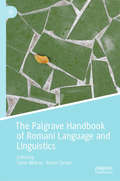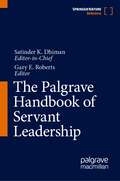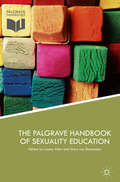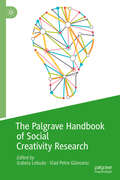- Table View
- List View
The Palgrave Handbook of Multidisciplinary Perspectives on Entrepreneurship
by Romeo V. Turcan Norman M. FraserDeparting from the traditional approach of surveying current and future trends and developments, this unique Handbook brings phenomena, theories, and concepts from multiple disciplines together to advance entrepreneurship. With original contributions from authors who are experts in their fields, the collection offers state-of-the-art insights into generating new areas for research, new theories and concepts, and new questions for policy debates – all aimed at advancing entrepreneurship. Divided into four sections and covering perspectives such as neuroscience, theology, organisational behavior and education, The Palgrave Handbook of Multidisciplinary Perspectives on Entrepreneurship is a rich source of information for researchers, educators, entrepreneurs, leaders and managers.
The Palgrave Handbook of Multilingualism and Language Varieties on Screen
by Irene Ranzato Patrick ZabalbeascoaThis handbook brings together contributions from the main experts in the field of multilingualism and language varieties (including dialects, accents, sociolects, and idiolects of specific speech communities) as expressed in fictional dialogue on-screen in films, and television series. The chapters included in the volume cover both the representation of these varieties and multilingual situations on screen as well as their translation into a range of languages. The handbook will thus be an essential resource for scholars and students in diverse fields including translation studies, audiovisual translation, linguistics, dialectology, film and television studies.
The Palgrave Handbook of Natural Gas and Global Energy Transitions
by Damilola S. Olawuyi Eduardo G. PereiraThe Palgrave Handbook of Natural Gas and Global Energy Transitions provides an in-depth and authoritative examination of the transformative implications of the ongoing global energy transitions for natural gas markets across the world.With case studies from Africa, Asia, Europe, North America, Latin America, South America, Australia, and the Middle East, the volume introduces readers to the latest legal, policy, technological, and fiscal innovations in natural gas markets in response to ongoing global energy transitions. It outlines the risk mitigation strategies and contractual techniques — focusing on resilience planning, low-carbon business models, green procurement, climate-smart infrastructure development, accountability, gender justice, and other sustainability safeguards — that are required to maximize the full value of natural gas as a catalyst for a just and equitable energy transition and for energy security across the world.Written in an accessible style, this book outlines the guiding principles for a responsible and low-carbon approach to the design, financing, and implementation of natural gas development and commercialization. It is an indispensable text and reference work for students, scholars, practitioners, and stakeholders in natural gas, energy, infrastructure, and environmental investments and projects.
The Palgrave Handbook of Occupational Stress
by Philippe Fauquet-Alekhine James ErskineThis handbook brings together an international group of experts to offer a comprehensive resource on occupational stress. Including both theoretical and practical perspectives, it examines ways to reduce and treat stress, as well as the physiological, psychosocial, and neural underpinnings of it. Through 24 original and carefully selected essays, the authors offer new insights, resources, and tools to better understand, manage and treat stress in a professional environment.The book’s chapters are divided into 5 parts that address the conceptualisation of stress; present theoretical models (including the contribution of animal models); examine the psychological and physiological aspects of stress and ways to assess it; delve into psychosocial risks at work and their assessment (means and methods); and investigate how to cope with stress at work, including resilience training. Aspects such as the effects of leadership, simulation training, and stress-tests for hiring are also presented and discussed. The volume ends by exploring broader considerations regarding stress and culture, stress and occupational sectors (with a chapter focusing on studentship), and the pharmacology of stress. This handbook is an essential reference for researchers in organisational psychology, as well as business and management and education, who are interested in stress. Healthcare workers and therapists who treat stress will also find an invaluable resource in this far-reaching yet accessible collection.
The Palgrave Handbook of Organizational Change Thinkers
by David B. Szabla William A. Pasmore Mary A. Barnes Asha N. GipsonThe key developments and advancements in organizational change over the last century are the result of the research, theories, and practices of seminal scholars in the field. While most books simply outline a theorist's model, this handbook provides invaluable insight into the contexts and motivations behind their contributions. Organized alphabetically, this handbook presents inspiring and thought-provoking profiles of prominent organizational change thinkers, capturing the professional background of each and highlighting their key insights, contributions, and legacy within the field of organizational change. By bringing these scholars' experiences to life, we can begin to understand the process of organizational change and analyze what remains to be done for organizations today. This book is the first of its kind--the go-to source for learning about the research and practice of organizational change from those who invented, built, and advanced the field. This comprehensive handbook will help researchers and students to develop their organizational change research agendas, and provide practitioners with concepts, theories, and models that can easily be applied to the workplace to lead change more effectively.
The Palgrave Handbook of Organizational Change Thinkers
by David B. SzablaThe key developments and advancements in organizational change over the last century are the result of the research, theories, and practices of seminal scholars in the field. While most books simply outline a theorist’s model, this handbook provides invaluable insight into the contexts and motivations behind their contributions. Organized alphabetically, this handbook presents inspiring and thought-provoking profiles of prominent organizational change thinkers, capturing the professional background of each and highlighting their key insights, contributions, and legacy within the field of organizational change. This updated edition add 29 profiles to the 87 original profiles. By bringing these scholars’ experiences to life, we can begin to understand the process of organizational change and analyze what remains to be done for organizations today. This book is the first of its kind - the go-to source for learning about the research and practice of organizational change from those who invented, built, and advanced the field. This comprehensive handbook will help researchers and students to develop their organizational change research agendas, and provide practitioners with concepts, theories, and models that can easily be applied to the workplace to lead change more effectively.
The Palgrave Handbook of Political Elites
by John Higley Heinrich BestThis handbook presents a comprehensive view of the current theory and research surrounding political elites, which is now a pivotal subject for academic study and public discourse. In 43 chapters by leading scholars, it displays the field's richness and diversity. The handbook is organized in six sections, each introduced by a co-editor, focusing on theories about political elites, methods for studying them, their main structural and behavioral patterns worldwide, the differentiation and integration of political elite sectors, elite attributes and resources, and the dilemmas of political elites in this century. Forty years since Robert Putnam's landmark Comparative Study of Political Elites, this handbook is an indispensable resource for scholars and students engaged in the study of this vibrant field.
The Palgrave Handbook of Populism
by Michael OswaldThis handbook assesses the phenomenon of populism—a concept frequently belabored, but often misunderstood in politics. Rising populism presents one of the great challenges for liberal democracies, but despite the large body of research, the larger picture remains elusive. This volume seeks to understand the causes and workings of modern-day populism, and plumb the depths of the fears and frustrations of people who have forsaken established parties. Although the main focus of this volume is political science, there are more disciplines represented in order to get a whole picture of the debate. It is comprised of strong empirical and theoretical papers that also bear social relevance.
The Palgrave Handbook of Positive Education
by Michael L. Wehmeyer Margaret L. KernThis open access handbook provides a comprehensive overview of the growing field of positive education, featuring a broad range of theoretical, applied, and practice-focused chapters from leading international experts. It demonstrates how positive education offers an approach to understanding learning that blends academic study with life skills such as self-awareness, emotion regulation, healthy mindsets, mindfulness, and positive habits, grounded in the science of wellbeing, to promote character development, optimal functioning, engagement in learning, and resilience.The handbook offers an in-depth understanding and critical consideration of the relevance of positive psychology to education, which encompasses its theoretical foundations, the empirical findings, and the existing educational applications and interventions. The contributors situate wellbeing science within the broader framework of education, considering its implications for teacher training, education and developmental psychology, school administration, policy making, pedagogy and curriculum studies.This landmark collection will appeal to researchers and practitioners working in positive psychology, educational and school psychology, developmental psychology, education, counselling, social work and public policy.
The Palgrave Handbook of Power, Gender, and Psychology
by Rose Capdevila Eileen L. ZurbriggenThe Palgrave Handbook of Power, Gender, and Psychology takes an intersectional feminist approach to the exploration of psychology and gender through a lens of power. The invisibility of power in psychological research and theorizing has been critiqued by scholars from many perspectives both within and outside the discipline. This volume addresses that gap. The handbook centers power in the analysis of gender, but does so specifically in relation to psychological theory, research, and praxis. Gathering the work of sixty authors from different geographies, career stages, psychological sub-disciplines, methodologies, and experiences, the handbook showcases creativity in approach, and diversity of perspective. The result is a work featuring a chorus of different voices, including diverse understandings of feminisms and power. Ultimately, the handbook presents a case for the importance of intersectionality and power for any feminist psychological endeavor.
The Palgrave Handbook of Practical Sustainability
by Robert Brinkmann Chit Wityi OoThis book provides a comprehensive look at practical sustainability around the world. The book takes a distinctly regional, case study perspective and highlights different approaches to managing sustainability challenges. Chapters by authors from all corners of the world look at a range of sustainability issues including environmental sustainability, environmental equity and justice, and government and business approaches to sustainability. The authorship of the book is distinctly global which provides an important perspective to this volume. Each chapter focuses on a different sustainability problem and how it was addressed in the region. Readers will take away a tremendous amount of information as to how sustainability challenges are addressed by leaders throughout the globe.
The Palgrave Handbook of Prison Design (Palgrave Studies in Prisons and Penology)
by Yvonne Jewkes Dominique Moran Kwan-Lamar Blount-Hill Victor St. JohnThis handbook brings together expertise from a range of disciplinary perspectives and geographical contexts to address a key question facing prison policymakers, architects and designers – what kind of carceral environments foster wellbeing, i.e. deliver a rehabilitative, therapeutic environment, or other ‘positive’ outcomes? The Palgrave Handbook of Prison Design offers insights into the construction of custodial facilities, alongside consideration of the critical questions any policymaker should ask in commissioning the building of a site for human containment. Chapters present experience from Australia, Chile, Estonia, Ireland, New Zealand, Norway, Russia, the United Kingdom, and the United States – jurisdictions which vary widely in terms of the history and development of their prison systems, their punitive philosophies, and the nature of their public discourse about the role and purpose of imprisonment, to offer readers theories, frameworks, historical accounts, design approaches, methodological strategies, empirical research, and practical approaches.
The Palgrave Handbook of Prison and the Family (Palgrave Studies in Prisons and Penology)
by Dominique Moran Marie HuttonThis handbook brings together the international research focussing on prisoners’ families and the impact of imprisonment on them. Under-researched and under-theorised in the realm of scholarship on imprisonment, this handbook encompasses a broad range of original, interdisciplinary and cross-national research. This volume includes the experiences of those from countries often unrepresented in the prisoner’s families’ literature such as Russia, Australia, Israel and Canada. This broad coverage allows readers to consider how prisoners’ families are affected by imprisonment in countries embracing very different penal philosophies; ranging from the hyper-incarceration being experienced in the USA to the less punitive, more welfare-orientated practices under Scandinavian ‘exceptionalism’. Chapters are contributed by scholars from numerous and diverse disciplines ranging from law, nursing, criminology, psychology, human geography, and education studies. Furthermore, contributions span various methodological and epistemological approaches with important contributions from NGOs working in this area at a national and supranational level. The Palgrave Handbook of Prison and the Family makes a significant contribution to knowledge about who prisoners’ families are and what this status means in practice. It also recognises the autonomy and value of prisoners’ families as a research subject in their own right.
The Palgrave Handbook of Psychological Perspectives on Alcohol Consumption
by Dominic Conroy Martin S. Hagger Richard Cooke Emma Louise Davies Richard O. de VisserThis Handbook provides a broad and comprehensive overview of psychological research on alcohol consumption. It explores the psychological theories underpinning alcohol use and misuse, discusses the interventions that can be designed around these theories, and offers key insight into future developments within the field.A range of international experts assess the unique factors that contribute to alcohol-related behaviour as differentiated from other health-related behaviours. They cover the theory and context of alcohol consumption, including possible implications of personality type, motivation and self-regulation, and cultural and demographic factors. After reviewing the evidence for psychological theories and predictors as accounts for alcohol consumption, the book goes on to focus on external influences on consumption and interventions for reducing alcohol consumption, including those based on purchasing and consumption behaviour, technologies such as personalised feedback apps, and social and media phenomena such as “Dry January” and “Hello Sunday Morning”. It brings together cutting-edge contemporary research on alcohol consumption in childhood and adolescence, including topics such as managing offers or drinks, “pre-drinking”, online identities, how children develop their beliefs about alcohol and how adolescents discuss alcohol with their parents. The book also offers a rounded presentation of the tensions involved in debates around the psychological impacts of alcohol use, discussing its role in helping people to socialise and unwind; as well as recognising the possible negative impacts on health, education and relationships. This book will be of interest to academics, policymakers, public health officials, practitioners, charities and other stakeholders interested in understanding how alcohol affects people psychologically. This book will also be a key resource for students and researchers from across the social sciences.
The Palgrave Handbook of Psychosocial Studies
by Stephen Frosh Julie Walsh Marita VyrgiotiOver the past decades, psychosocial studies has demonstrated its strengths and influence across diverse sites of theory and practice; it continues to grow as an area of transdisciplinary research that dialogues with psychoanalysis, sociology, critical psychology, cultural studies, gender and sexuality studies, and postcolonial studies. The Palgrave Handbook of Psychosocial Studies is the first Major Reference Work to explore the history and depth of the field and offer a critical evaluation of contemporary theories, empirical methods and practices of psychosocial studies. With 50 chapters, this state-of-the-art collection:· reflects back on texts that have influenced the development of psychosocial studies from a 2020s perspective· explores current major topics with evaluative reviews· identifies newly emerging areas ofenquiry · features a wide range of international psychosocial voices. Published chapters can be read and downloaded individually online: https://link.springer.com/referencework/10.1007/978-3-030-61510-9 The Palgrave Handbook of Psychosocial Studies is unique in covering a wide range of psychosocial topics and in being written accessibly from many different perspectives. It will appeal to students, scholars and practitioner-researchers alike.
The Palgrave Handbook of Race and Ethnic Inequalities in Education
by Peter A. J. Stevens A. Gary DworkinThis authoritative, state-of-the-art reference work builds on its first edition to provide a cutting-edge systematic review of the relationship between race/ethnicity and educational inequality. Studying 25 different national contexts drawn from every inhabited continent on earth and building upon material from the earlier edition, the work analyses educational policies, practices and research on minority students, immigrants and refugees. The editors and contributors explore principal research traditions from countries as diverse as Argentina, China, Norway and South Africa, examining the factors promoting social cohesion as well as considerations regarding the use of international test score data. Seamlessly integrating findings of national reviews, the editors and contributors analyse how national contexts of race/ethnic relations shape the character and content of educational inequalities, and deftly map out new directions for future research in the area.Global in its perspective and definitive in content, this one-stop volume will be an indispensable reference resource for a wide range of academics, students and researchers in the fields of education, sociology, race and ethnicity studies and social policy.Chapter 20 of this book is available open access under a CC BY 4.0 license at link.springer.com
The Palgrave Handbook of Radical Left Parties in Europe
by Fabien Escalona Luke March Daniel KeithThis profound and insightful handbook aims to promote critical reflection on the way we conceptualise and study the radical left and to advance research by asking new questions. Radical left parties in Europe have been the subjects of significant study in the last decade, aided by the demonstrable success of newer parties like the Greek Syriza and Spanish Podemos, as well as the persistence of more established actors like the German Die Linke. Nevertheless, the emergent literature remains patchy and many elements of the party family still poorly understood. This handbook brings together a range of leading analysts to provide a definitive compendium, one that provides both students and scholars with an informative and easy-to-use guide to the radical left in Europe. Through utilising a common analytical framework to analyse the radical left in 19 European countries (within and outside the EU), the Palgrave Handbook of Radical Left Parties in Europe provides a wealth of comparable data on a wide number of cases to provide a sound basis for future studies. This rigorous comparative framework, allied with the unprecedented in-depth overview of the development of the European radical left over the past two decades, makes this handbook an essential starting place for those interested in all aspects of the radical left as a party family.
The Palgrave Handbook of Relational Sociology
by François DépelteauThis handbook on relational sociology covers a rapidly growing approach in the social sciences—one which is connected to the interests of a large, diverse pool of researchers across a range of disciplines. Relational sociology has been one of the key foundations of the “relational turn” in human sciences since the 1980s, and it offers a unique opportunity to redefine the basic epistemological and ontological principles of sociology as we know it. The contributors collected here aim to elucidate the complexity and the scope of this growing approach by dealing with three central questions: Where does relational sociology come from and what are its principal concerns? What are the main theoretical and methodological currents within relational sociology? What have we studied in relational sociology and what are the results?
The Palgrave Handbook of Religion, Peacebuilding, and Development in Africa
by Ezra Chitando Joram Tarusarira Susan M. KilonzoThis Handbook explores the ways in which religion among the African people has been applied in situations of conflict and violence to contribute to sustainable peace and development. It analyzes how peacebuilding inspired and enabled by religion serves as the foundation for sustainable development in Africa, while also acknowledging that religion can also be a tool of destruction, and can be used to fuel violence and underdevelopment. Contributors to this volume offer theoretical discussions from existing literature, as well as experiences of practitioners, to deepen the readers’ understanding on the role of religion and religious institutions in peacebuilding and development in Africa. The Handbook provides reflections on possible future developments as well, thereby aligning with the goals of SDG 16.
The Palgrave Handbook of Reproductive Justice and Literature
by Laura Lazzari Beth Widmaier CapoThis handbook offers a collection of scholarly essays that analyze questions of reproductive justice throughout its cultural representation in global literature and film. It offers analysis of specific texts carefully situated in their evolving historical, economic, and cultural contexts. Reproductive justice is taken beyond the American setting in which the theory and movement began; chapters apply concepts to international realities and literatures from different countries and cultures by covering diverse genres of cultural production, including film, television, YouTube documentaries, drama, short story, novel, memoir, and self-help literature. Each chapter analyzes texts from within the framework of reproductive justice in an interdisciplinary way, including English, Japanese, Italian, Spanish, and German language, literature and culture, comparative literature, film, South Asian fiction, Canadian theatre, writing, gender studies, Deaf studies, disability studies, global health and medical humanities, and sociology. Academics, graduate students and advanced undergraduate students in Literature, Gender, Sexuality and Women’s Studies, Cultural Studies, Motherhood Studies, Comparative Literature, History, Sociology, the Medical Humanities, Reproductive Justice, and Human Rights are the main audience of the volume.
The Palgrave Handbook of Research Methods and Ethics in Neurodiversity Studies
by Hanna Bertilsdotter Rosqvist David Jackson-PerryThis timely volume brings together well-established scholars and emerging voices to explore research methods and ethics in Neurodiversity Studies. It explores the epistemic injustice that currently surrounds much knowledge production around neurodivergence, and offers concrete examples of creative, participatory, and collaborative research practice in the field. The editors have assembled chapters combining reflexive, theoretical, and practical contributions. Together they address current debates surrounding participatory methods and Neurodiversity Studies and are unique in giving voice to mainly neurodivergent researchers and contributors across autism, ADHD, acquired brain injury, and multiple neurodivergence. The first of its kind, this much-needed volume contains essential reading for all those learning and teaching in the field of neurodiversity. It further represents a valuable resource for students and academics at all levels, participatory or creative researchers, research commissioners, and research evidence users across the social sciences.
The Palgrave Handbook of Romani Language and Linguistics
by Yaron Matras Anton TenserRomani is the first language, and family and community language, of upwards of 3-4 million people and possibly many more in Europe, the Americas, and Australia. Documentation and research on the language draws on a tradition of more than two centuries, yet it remains relatively unknown and often engulfed by myths. In recent decades there has been an upsurge of interest in the language including language maintenance and educational projects, the creation of digital resources, language policy initiatives, and a flourishing community of online users of the language. This Handbook presents state of the art research on Romani language and linguistics. Bringing together key established scholars in the field of linguistics and neighbouring disciplines, it introduces the reader to the structures of Romani and its dialect divisions, and to the history of research on the language. It then goes on to explore major external influences on the language through contact with other key languages, aspects of language acquisition, and interventions in support of the language through public policy provisions, activism, translation, religious and literary initiatives, and social media. This comprehensive and groundbreaking account of Romani will appeal to students and scholars from across language and linguistics.
The Palgrave Handbook of Servant Leadership
by Satinder K. DhimanThis reference work offers comprehensive perspectives on servant leadership. Featuring a cadre of leading world-class scholars, practitioners, and contributing authors from diverse fields of inquiry, it aims to collate research on servant leadership with a particular focus on its moral and spiritual dimensions.It is divided into sections that center on topics such as character, philosophical influences, diversity and inclusion, critiques of servant leadership as well as examples of servant leadersThough first introduced in the 1970 by Robert Greenleaf, the field of servant leadership is still lacking consensus on a definition and a theoretical framework. The goal of this reference work is to begin to fill this gap by assembling the scholarship of the top scholars in this field and providing a go-to source for information on the theory and practice of servant leadership. This handbook will serve as an essential resource for researchers, scholars, and students of organizational behavior, human resource management, and business ethics, as well as consultants and business leaders interested in discovering the best leadership models to suit contemporary organizations.
The Palgrave Handbook of Sexuality Education
by Louisa Allen Mary Lou RasmussenThis authoritative, state-of-the-art Handbook provides an authoritative overview of issues within sexuality education, coupled with ground-breaking discussion of emerging and unconventional insights in the field. With 32 contributions from 12 countries it definitively traces the landscape of issues, theories and practices in sexuality education globally. These rich and multidisciplinary essays are written by renowned critical sexualities studies experts and rising stars in this area and grouped under four main areas:Global Assemblages of Sexuality EducationSexualities Education in SchoolsSexual Cultures, Entertainment Media and Communication TechnologiesRe-animating What Else Sexuality Education Research Can Do, Be and BecomeImportantly, this Handbook does not equate sexuality education with safer sex education nor understand this subject as confined to school based programmes. Instead, sexuality education is understood more broadly and to occur in spaces as diverse as community settings and entertainment media, and via communication technologies. It is an essential and comprehensive reference resource for academics, students and researchers of sexuality education that both demarcates the field and stimulates critical discussion of its edges. Chapter 2 is available open access under a CC BY 4.0 license via link.springer.com.
The Palgrave Handbook of Social Creativity Research (Palgrave Studies in Creativity and Culture)
by Vlad Petre Glăveanu Izabela LebudaThis Handbook brings together an international cast of experts to explore the social nature and context of creativity studies, focusing on methodology as a key component in advancing the social study of creativity. Two decades on from the pioneering work of Alfonso Montuori and Ronald E. Purser, the authors present a timely appraisal of past and present work in social creativity studies, and look ahead to future developments within this field. The authors collectively offer a rigorous examination of the methodological and empirical issues and techniques involved in studying social creativity. They examine the phenomenon as a form of communication and interaction within collaborative relationships; contending that creativity happens not within a vacuum but instead from a nexus of personal, social and contextual influences.This comprehensive work is organized in three parts, focusing first on the various methodological approaches applicable to the social in creativity studies. It secondly turns to empirical findings and approaches relating to the social nature of creativity. In the book’s final part, the authors offer reflections on the state of social research into creativity, pinpointing areas requiring further methodological scrutiny and empirical verification, and areas that may inspire further theoretical or applied work. Combining classic ideas with cutting-edge, emerging methods, this work provides a vital methodological ‘toolbox’ for investigators within social creativity.
